
With physician turnover rates still higher than pre-pandemic levels and recruitment costs around $200K per physician, healthcare organizations can no longer afford to wait to focus on retention. Unfortunately, only 23% of healthcare organizations even have a formal physician retention plan. As you review or implement your retention plan, consider these five ways to improve physician satisfaction and engagement.
1. Start with physician onboarding
According to Scott Polenz, principal consultant for CHG Advisory Services, "A formal, well-structured onboarding program is a key driver of physician engagement. It helps new physicians feel confident, connected, and supported, enabling them to integrate into the organization’s culture and workflow more quickly."
He continued, “Strong onboarding boosts productivity, strengthens collaboration, and supports better patient care.” In a survey about onboarding practices, 56% of physicians who had a positive onboarding experience expressed high job satisfaction, while only 19% of those with a negative onboarding experience did. Organizations that effectively onboard their physicians set them up for long-term success.
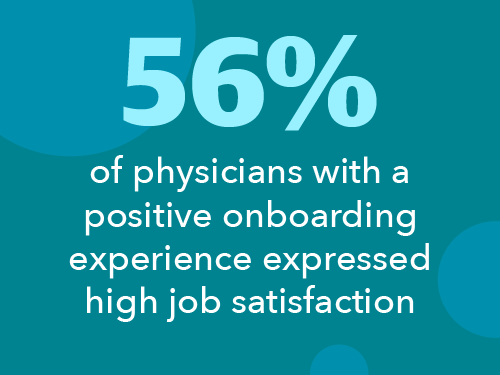
Amy Powell, former director of provider recruitment and retention at Reid Health, said her organization focused on improving their onboarding to improve retention.
“If you onboard correctly and make that experience enjoyable and tailored to the provider, that person will get up to speed faster, thus creating satisfaction for both the provider and organization,” she said.
2. Provide liaisons and mentors for new hires
As part of a complete onboarding experience, mentorship programs are a cost-effective way to help improve work-life balance, support career development, reduce burnout, and foster camaraderie. And, both mentors and mentees report it’s a positive experience.
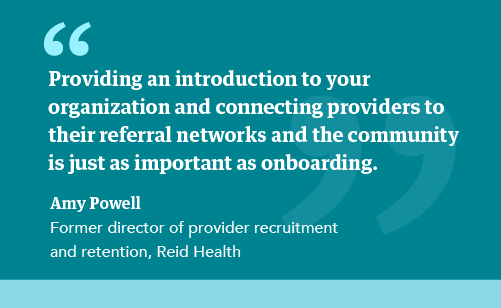
“Providing an introduction to your organization and connecting providers to their referral networks and the community is just as important as onboarding,” said Powell. “Reid’s liaison team starts working with new hires at the time of their start date. Sometimes just learning an organization takes over a year. Our liaison team helps to speed that process up for new providers.”
Powell also noted that newly hired clinicians have access to a one-year mentorship program. Mentors often intentionally come from another service line to create space for new clinicians to share doubts or struggles they’re having as they onboard.
Up your game: Secret strategies for physician retention
3. Provide benefits that enrich their experience
When it comes to compensation, money isn’t the only thing clinicians are interested in. If additional perks help keep them engaged and loyal, they may be worth the extra cost.
Creating opportunities for new clinicians and their families to feel like part of their community is one way Reid Health hopes to retain their employees. “So many times, the physician is happy, and they love practicing here, but their family doesn’t get engaged in the community,” said Powell. “So, we’re offering country club memberships to try and connect and engage families in the local community.”
Medical school debt can also be a burden for clinicians, so Reid Health is offering ways to help them better manage their finances. “As a nonprofit, we qualify for the Public Service Loan Forgiveness program,” said Powell. “That program has a lot of myths and many physicians don’t completely trust it. We’ve engaged an outside firm that specializes in student loan navigation, and it gives them a resource to tackle their loan repayment. We hope that resource is a motivation to help them stay for the long term.”
4. Solicit and act on physician feedback
Feedback boosts physician performance and reduces burnout. Polenz asserts that physicians who feel their voice matters are more likely to feel “valued, engaged, and invested in the organization’s success.”
“Listen to your physicians, ask them for feedback, and don’t be afraid to try something,” Powell said. “Try it, assess it after a period of time, and if it works, great. If it doesn’t, it’s ok to say, ‘That didn’t work; let’s try something different.’ I think that listening to your physicians and what their needs are is the most important aspect of trying to retain them.”
The way feedback is solicited is important. According to CHG Healthcare’s 2025 physician sentiment survey, 52% of physicians prefer giving their input in regular, face-to-face meetings as opposed to just 23% through more impersonal methods such as employee experience surveys.
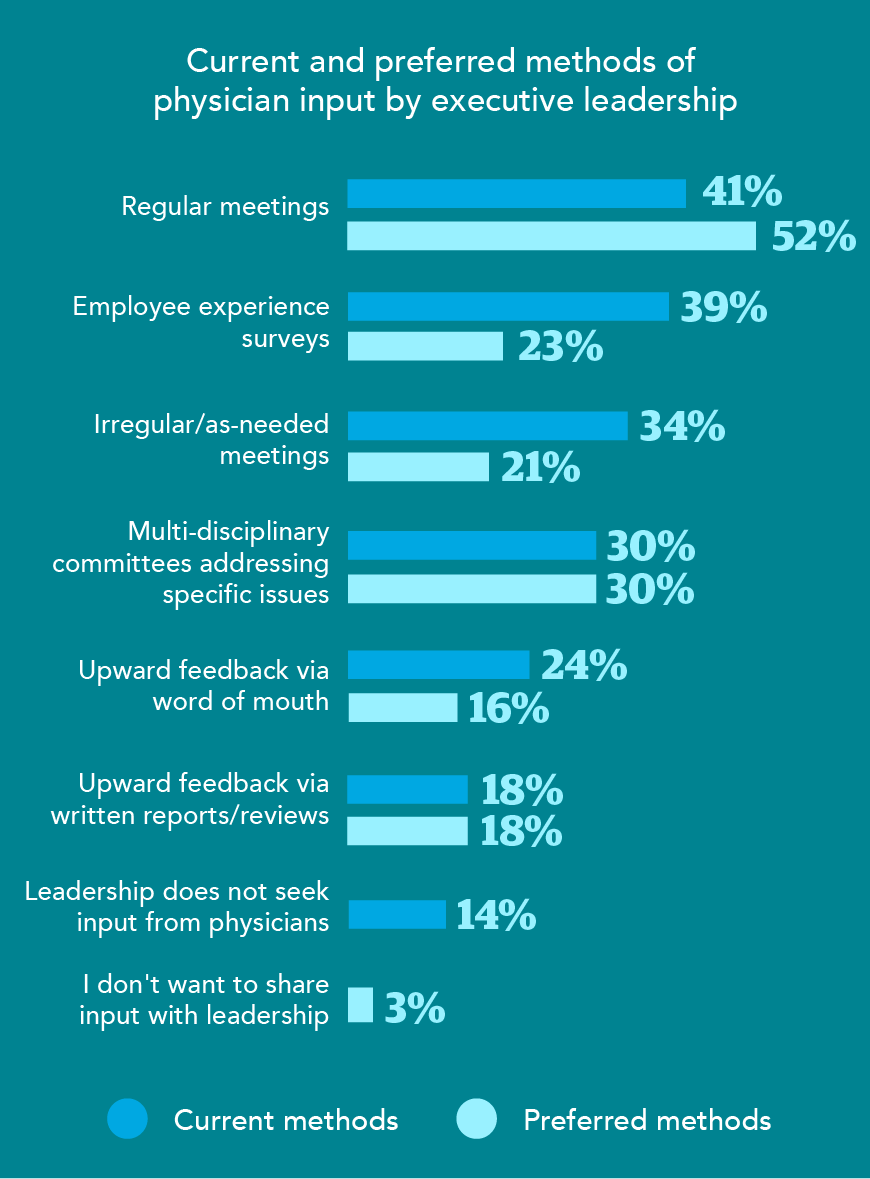
Not only is it important to ask for and listen to your clinicians’ feedback, but it is also essential that your organization holds itself accountable for action, improvement, and consistency. Most physicians want to be involved in organizational decisions, but only 40% feel that their input is solicited or incorporated.
At Reid Health, the Physician Engagement and Resilience Committee (PERC), composed of physicians with support from administrative staff, have “a feedback loop process where anyone can fill out an automated concern form. It goes to the appropriate person and feedback is documented,” said Powell.
The committee reviews all concerns monthly. “If it’s physician parking or something with the EMR, action is taken right away. If a concern is not getting addressed, people are going to be asking questions,” said Powell. “That physician or clinician can check in at any time and see where their concern is in the process, if it’s been resolved, or if it’s on hold for some reason. It’s a way to communicate and get a response back to people so that they know they are being heard.”
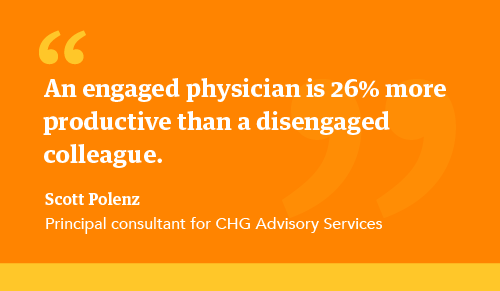
An investment in physician well-being can translate into revenue, according to Scott Polenz. “The cost of losing just one physician is as high as $1 million. An engaged physician is 26% more productive than a disengaged colleague, generating significant additional revenue each year and strengthening the organization’s financial health and long-term sustainability.”
Learn what physicians care about: Read the findings in CHG's Physician Sentiment Survey Report
5. Measure provider retention
How you determine the success of your retention efforts will vary for each organization, but it’s important to have success metrics and track them. Powell said that Reid Health looks at turnover rates as well as locums spend to determine if their employee retention strategies are working. “A small reduction in turnover pays off big time when you’re talking about physician retention,” said Powell. Another thing she noticed is that many clinicians who left later returned to work at Reid Health. “I think that speaks highly of our organization. We have several instances of people leaving and figuring out the grass isn’t greener on the other side.”
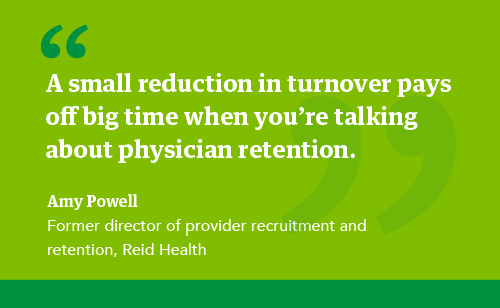
Physician retention should be at the forefront of the conversation about cost reduction and growth. When healthcare organizations adopt a culture that treats physicians as an asset to be invested in, rather than a cost center to be reduced, it boosts the health of the entire organization.
CHG can help your healthcare facility keep your providers and grow your organization. To learn more, contact us by phone at 866.570.9920 or email advisoryservices@chghealthcare.com.